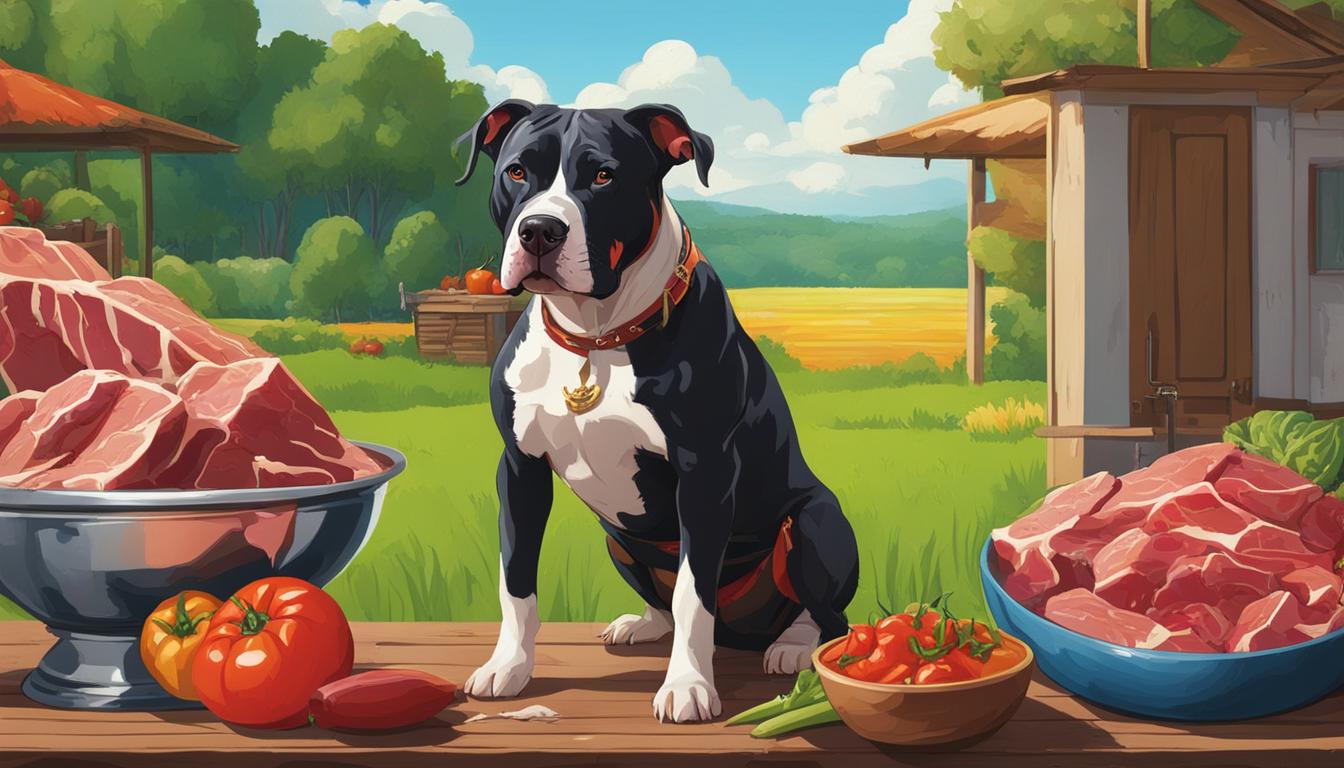Raw diets for Pitbulls are gaining popularity among owners, and it’s no surprise why. Feeding your Pitbull raw, unprocessed foods has many benefits. These foods improve their health and well-being. It provides them with the nutrients they need. It supports their natural instincts and digestion.
By opting for a raw diet, you can ensure that your Pitbull receives a balanced and natural nutrition plan. Raw feeding is about giving animals the nutrients they need. They would eat these in the wild. This includes raw meat, bones, organs, and vegetables.
Switching your Pitbull to a raw diet can improve their coat quality. It can also boost their energy levels and support their immune system. Raw diets can also help maintain a healthy weight. They can also reduce the risk of certain health issues.
Learn more about essential supplements for Pitbull raw diets in our detailed guide. Discover how to choose the best raw diet for your furry friend. The nutrition of your Pitbull is important. Raw diets can improve their well-being.
I switched to a raw food diet similar to those super ripped pitbulls and this was only after a week. Raw meat is really roids for dogs pic.twitter.com/zE1zWaMqEc
— Jeff (@That1guyJeff) October 24, 2018
Essential Supplements for Pitbull Raw Diets
Pitbulls enjoy raw diets, which are natural and nutritious. But, certain supplements can enhance their health and well-being. These supplements help ensure your Pitbull gets all essential nutrients. Your Pitbull needs these supplements for optimal growth and development. Here are some key supplements to consider adding to your Pitbull’s raw meals:
Vitamin and Mineral Supplements
Supplements are essential for balanced nutrition in your Pitbull’s raw diet. Supplements fill nutrient gaps caused by varying raw ingredient quality. Some essential vitamins and minerals to consider include:
- Vitamin E: Promotes healthy skin and coat.
- Vitamin D: Supports strong bones and teeth.
- Calcium: Essential for bone and muscle health.
- Zinc: Helps with immune function and wound healing.
Omega-3 Fatty Acids
Omega-3 fatty acids benefit your Pitbull’s skin. They also improve coat and reduce inflammation. Adding fish oil or other omega-3 supplements to their raw meals can help in three ways. It can reduce skin allergies, improve coat condition, and reduce joint inflammation. Ensure that the supplement is suitable for dogs. Follow the recommended dosage.
Probiotics
Probiotics are beneficial bacteria that promote a healthy gut and aid in digestion. Adding a probiotic supplement to your Pitbull’s raw diet can help. It maintains a balanced gut microbiome, improves nutrient absorption, and reduces digestive issues. Look for a top-notch probiotic made for dogs. Follow the recommended dosage.
| Supplement | Benefits |
|---|---|
| Vitamin E | Promotes healthy skin and coat. |
| Vitamin D | Supports strong bones and teeth. |
| Calcium | Essential for bone and muscle health. |
| Zinc | Helps with immune function and wound healing. |
Remember to consult with your veterinarian before adding supplements to your Pitbull’s diet. It’s important. They offer personalized recommendations for your dog’s specific needs. This helps ensure a well-rounded and balanced raw diet.
Choosing the Best Raw Diet for Your Pitbull
Feeding your Pitbull a raw diet requires choosing the best options. These options should meet their nutritional needs. Here are some tips to help you make an informed decision:
1. Consult with Your Veterinarian
It’s a good idea to consult with your veterinarian before changing your Pitbull’s diet. They can provide guidance based on your dog’s specific needs and help you create a balanced meal plan.
2. Research Raw Food Brands
Many brands of raw food are available. Take time to research and compare different options. Look for brands that use high-quality, human-grade ingredients and follow strict safety standards. Reading reviews and seeking recommendations from other Pitbull owners can also be helpful.
3. Consider Your Pitbull’s Individual Needs
Every Pitbull is unique, and their dietary requirements may vary. Consider their age, activity level, and specific health concerns. Some dogs may need more protein. Others may need extra supplements.
4. Introduce New Foods
When transitioning your Pitbull to a raw diet, it’s important to do so. Start by adding a little raw food to their meals. Increase the amount over time. This will help their digestive system adjust and cut any potential stomach upset.
You can choose the best raw diet for your Pitbull. Follow these tips to provide them with optimal nutrition and wellbeing.
FAQ
Are raw diets suitable for Pitbulls?
Yes, raw diets are suitable for Pitbulls and offer many health benefits.
What are the benefits of feeding a raw diet to Pitbulls?
Raw diets can provide Pitbulls with the nutrients they need. These diets also improve digestion and promote healthier skin and coat. Additionally, they can assist in weight management.
Do Pitbulls need any supplements when on a raw diet?
Raw diets provide necessary nutrients. We recommend adding supplements. Supplements include fish oil, probiotics, and joint supplements. This enhances nutritional intake.
How do I choose the best raw diet for my Pitbull?
Consider factors when determining your Pitbull’s diet: age, activity level, and specific needs. Research different brands and consult with your veterinarian for guidance.
How should I transition my Pitbull to a raw diet?
Start by introducing small amounts of raw food alongside their current diet. Increase the raw food part while reducing the previous diet over a period of about two weeks.
Can I feed my Pitbull a raw diet only, or should I include other foods?
Some owners choose to include vegetables or organs for variety. They can feed a balanced raw diet only for nutrition.
Are there any potential risks or concerns with feeding my Pitbull a raw diet?
You should balance raw diets for complete nutrition. Not following food handling and storage guidelines risks bacterial contamination. Regular veterinary check-ups are also important to check your Pitbull’s health.
